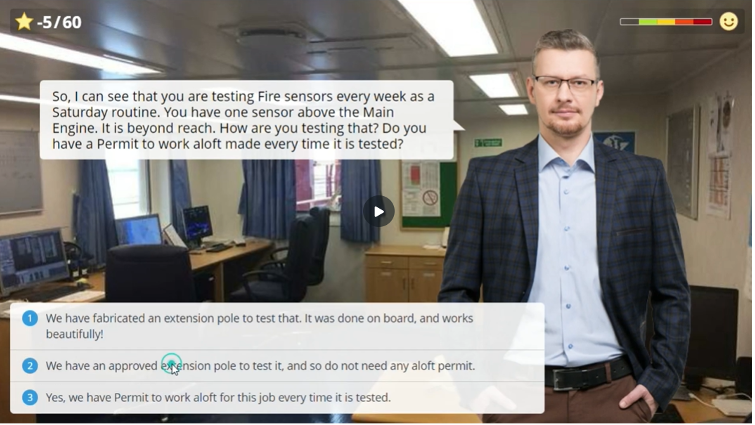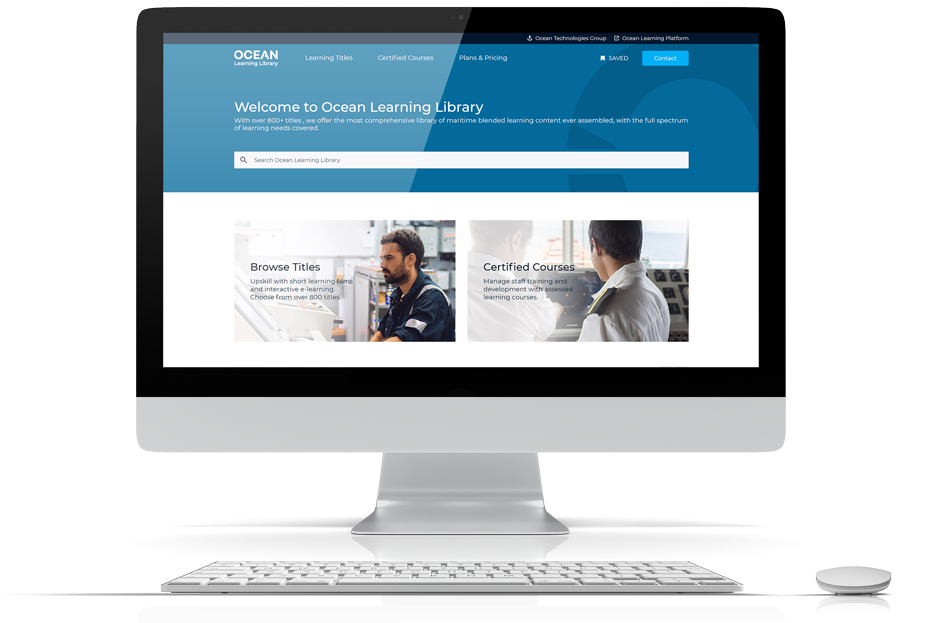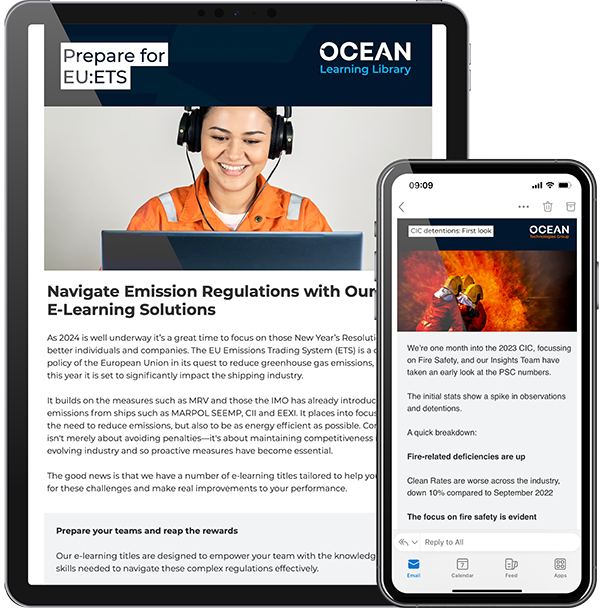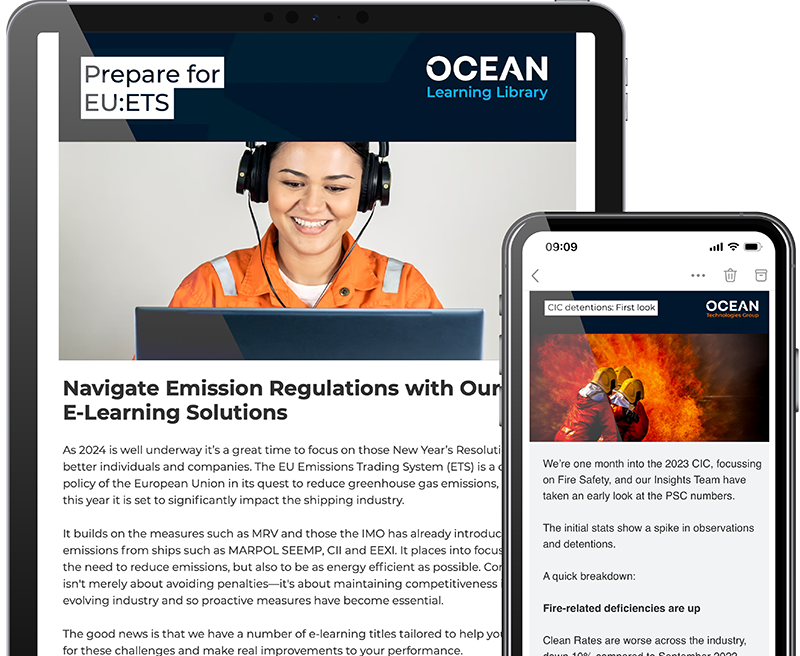SIRE 2.0 Preparedness: Facing Inspector Interviews
Industry expert:

Captain Debashis Basu
Managing Partner, Navguide Solutions
As part of our series of articles designed to help companies and crew prepare for inspections, we have invited Captain Debashis Basu of Navguide Solutions to share his expertise on the role of inspector interviews in the outcome of an inspection.
Alongside actionable tips, Captain Debashis provides examples of how the Navguide simulations available through the Ocean Learning Platform can support better crew performance in inspection interviews.
Interviews are critical in inspections.
The outcome of an inspection does not just depend on how the vessel was physically prepared or how well the documentation was maintained; Anyone who has been through vessel inspections would agree that interviews have always played a major role. The inspector must answer the pivotal question:
Is the vessel staff trained to carry out their jobs safely and effectively?
And how does the inspector know that? He asks! He interacts.
With an increased focus on human factors and OCIMF’s determination to identify knowledge gaps, SIRE 2.0 will place more importance on the outcome of interviews. It will not be only the Master or the Chief Engineer expected to reply to the inspector’s queries; it will be equally important for every other rank to face and correctly answer questions from the inspector.
Are we ready for that? In this article, we will discuss a tangible solution to prepare the ship staff for interviews using scenario-based games – modules based on a role-playing concept available on the OTG Platform.

Where can interviews go wrong?
Two major issues may derail an interview, turning the impression of the ship from being one of a well-managed vessel to otherwise. Let us understand them clearly.
Imagine this scenario: Captain Alfred, the SIRE Inspector, is conducting a bridge inspection. Second officer Ryan is in attendance. The Master is busy with his documentation and will not join them.
The knowledge aspect
Captain Alfred asks:
“How are you maintaining the record of Navtex warnings?” Ryan shows the Navtex file, but the inspector digs deeper, “What does the company say about maintaining Navtex records? Can you show me this procedure in your Navigation manual?”
Well, it turns out that Ryan did not clearly understand the company procedure related to the subject. This results in a human observation under SIRE 2.0, Section 4.1.10. Unfortunate but straightforward, as expected.
The Attitude aspect
Now that Ryan has been caught with a knowledge gap, his confidence is shaken. The inspector walks up to the bridge wing and finds a mismatch between the wing gyro repeater and the centreline repeater. This is going to be another observation. Captain Alfred states,
“I see the repeaters are not aligned.”
This time, Ryan gets defensive:
“This is not my fault. I told the third officer to check it on arrival. He has not checked it. What can I do?”
As counterintuitive as it might sound, it is not uncommon to hear an arrogant or nervous reply like this from a seafarer. Getting defensive can trigger a chain reaction and significantly derail the inspection. Why?
- Ryan seemed desperate to prove his personal innocence instead of the vessel’s preparedness to follow procedures. This was not professional.
- It seems there are gaps in the instructions given and received on board.
- There seems to be a lack of teamwork and more of a blame game going on.
- The mismatch would not have occurred if the gyro repeaters were checked regularly. Capt Alfred could not see any objective evidence this was the case.
- Ryan seems nervous. Is he maintaining the rest of the bridge adequately? Capt Alfred needs to go for an extended inspection now.
- Does Ryan know how to correct the situation by aligning the compasses?
In under five minutes, Ryan has placed enough concern in Captain Alfred’s mind that will cause him to dig much deeper. The inherent bias is that if the vessel staff is not confident, this may not be a very well-managed vessel. With those thoughts, the inspector may now place more areas of the ship and operations under greater scrutiny.
Now consider an alternative scenario: When Capt Alfred enquires about the mismatch of the gyro repeaters, Ryan replies:
“Yes, you are right; there is a mismatch. However, we are checking them at every watch; here are the records (he shows the deck log). I will realign them now.”
This time, the impression is very different. Capt Alfred looks at the records and is satisfied. Sure, something got overlooked, but the vessel seems well-managed.
Polite and professional
We all have heard our mentors say – you must be polite yet professional when facing an inspector. But what do we really mean by polite or professional? Those words have different meanings based on where we come from and even our state of mind on a given day. I may think I am being professional, yet you may feel I am coming across as arrogant.
How would you or your colleagues respond in one of the following situations?
- The Chief Engineer is about to complete bunkering. The inspector walks into his office while he is busy speaking to the engine watchkeepers in charge. Can the Chief Engineer react cordially without getting distracted from his task?
- A gangway watch faces an arrogant inspector in a hurry to go inside without properly completing the gangway formalities.
- An inspector, to test the attitude of the duty officer, asks for an ashtray on the bridge, where the bridge is not a smoking area.
How we can prepare
These things do not have to be left to chance. With the proper preparation, all crew can have the confidence and skills needed to successfully navigate inspection interviews.
At Navguide Solutions, we have created Simulation Games and Scenario-based games, which are available in the OTG Library. These have been designed specifically to prepare seafarers for interviews, helping them keep in mind:
- To not only tackle the knowledge aspect but also point to the right attitude.
- The goal is not to be boring and instructional but rather to present specific, rank-based, realistic, interactive scenarios that play out depending on the user’s reply.

These games have been created with senior subject matter experts and inspectors, incorporating their decades of experience into an engaging and easily accessible that closely replicates the questions and pressures seafarers will face in an inspection interview.
Games as a tool to prepare
We have created a library of such games covering various SIRE 2.0 questions that are likely to come up in an interview.
The game starts as the inspector meets the gangway watch. It then follows the usual pattern of an inspection, in interviewing the Master, senior deck and engine officers, the second officer on navigation, as well as other applicable roles, such as the pumpman, the manifold watch, gas engineers, the SBM watch, and the duty engineer (without the presence of the Chief Engineer).
Each game covers a specific scenario for a particular rank and comes with about ten questions. This is an individual activity but can also be used to conduct workshops on board. A Bosun or a third engineer can click on them and familiarise themselves with the concept.

Interviews are potential Single Points of Failure
In space missions, elements that can cause the entire mission to fail are typically called “single points of failure” (SPOFs). For example, a critical propulsion system, life support system, or even software controlling the spacecraft could all be SPOFs. Space agencies go to great lengths to identify and mitigate these SPOFs through rigorous testing, redundancy, and backup systems to ensure the mission can continue or be safely aborted if a critical component fails.
On earth, in maritime inspections, Interviews are potential SPOFs. They are meant to put the vessel’s management style under scrutiny. A single interview gone horribly wrong could damage the reputation of the vessel and the company.
Benefits of Scenario-Based Games
- Engagement and Immersion: By placing seafarers in interactive scenarios mirroring real-world inspection situations, they foster a deeper understanding of what to expect in a safe and controlled environment.
- Decision-Making Skills: Seafarers develop and hone their decision-making skills through immersive, hands-on training, preparing them to respond effectively and confidently during SIRE 2.0 inspections.
- Attitude development: For the first time, we address situations where soft skills are required to help build the right tone.
- Setting the right mindset: Introvert seafarers or those without fluency in English may find interviews unnerving & intimidating, even if they know their jobs. This approach eases the tension and gets them into the right mindset.
Bridging theory and practice
Interviews are here to stay.
At Navguide Solutions, our mission is clear: to bridge the gap between theoretical knowledge and practical application, ultimately enhancing safety and efficiency in the maritime industry. Our scenario-based games epitomize this commitment, offering seafarers a dynamic and effective guide that any rank can benefit from.
The Navguide-OTG Collaboration
Innovation is the compass that guides us towards a safer, more efficient maritime industry. Navguide Solutions, an innovative company working in the inspection space for over four years, partnered with OTG, the world leader in maritime training, to provide easier access to valuable tools that can help seafarers navigate the complexities of inspections, such as RightShip and SIRE 2.0 with confidence and competence. Scenario-based games are one of the many such tools.
Together, we are enabling the improved safety and performance of our maritime professionals.
The maritime industry’s best e-learning content
Unparalleled breadth and quality of content. We offer the most comprehensive library of maritime blended learning content ever assembled.


Subscribe to our Newsletter
Stay connected with our guides, insights, news and more.

